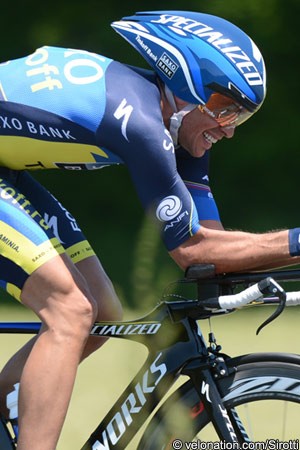“I hope the route will go well for me. The most important thing are the legs and to arrive in form at the optimal moment.”
 He tried, he failed, he promised to come back again and win the race. Alberto Contador may have missed out on the 2013 Tour de France title but he proclaimed himself satisfied with the layout of next year’s route when he attended the launch today.
He tried, he failed, he promised to come back again and win the race. Alberto Contador may have missed out on the 2013 Tour de France title but he proclaimed himself satisfied with the layout of next year’s route when he attended the launch today.
The Team Saxo Tinkoff rider watched organisers ASO unveil a parcours which is mainly flat in the first week, features nine cobble sections on stage five, includes five summit finishes and a long 54 kilometre time trial from Bergerac to Perigueux on the penultimate day.
Given that he’s one of the best riders uphill and against the clock when in form, it was not surprising that he gave it a tentative thumbs up.
“It’s fairly balanced,” he said, weighing up the different attributes of the 101st Tour de France. “It will be very important to see how each rider emerges after the first nine flat stages, especially the fifth, because of the cobblestones.”
That stage includes no less than nine cobblestone sectors, stretches of jarring terrain which will test the skill and nerve of each of the riders in the peloton, and which could derail the ambitions of one or more of the GC favourites in an instant.
The risk will be exacerbated if the conditions are wet, with that certain to make the pave even more treacherous.
Despite that, he’s not losing sleep over it at this point. “Although there is risk of falls and mechanical problems, it is a very nice stage for the spectator, although very nervous for us. I hope to get through it well. In 2010 I lost a few seconds due to a mechanical, but the key is to be focused.”
Saxo Tinkoff team owner Bjarne Riis believes that the former Tour winner should cope well. “Stage five with the cobblestones is definitely worth watching. As we know from the past, there are risks associated with the treacherous surface but it’s a part of the game that we see as a challenge,” he stated. “Also, Alberto is not bad on the cobbles.
“I’m looking forward to entering the Vosges mountains – that could easily create havoc in the peloton and as always, the Alps and Pyrenees offer some entertaining key stages.”
Contador battled hard this year, sitting second overall behind Chris Froome, but faded in the final week and was ultimately fourth in Paris. He has said that he feels he can be in much better shape next year, based on his belief that he got his buildup wrong.
Determined to work hard, the Spaniard said that there was an important plus about seeing the course at this time of the year. “It is the motivation that gives me to know the route already, and to start thinking about next season. I think it’s very balanced route and I hope I’ll adapt well to it.
“I hope the route will go well for me. The most important thing are the legs and to arrive in form at the optimal moment.”
For him and the other GC riders, the priority is to stay clear of trouble early on. The opening week of the Tour de France is often characterised by crashes and while this year’s tough start in Corsica helped to calm things down, the parcours for this year is different early on.
“It will be very nervous,” he admitted, speaking about the start to the race. “So we cannot make an assessment until the finish of those first stages.”
After that, he and the other GC riders will move into their preferred terrain, and the gaps will open up. He believes that there will be a lot of attacking due to the nature of the uphill stages.
“As for the mountains, they are very distributed among the three mountain ranges. The short stages stand out, because they will give much encouragement for risky moves.”
If he’s back to his best form, he’ll see those as opportunity to take time. The race against the clock is another consideration but, in peak condition, he can also be prominent there.
“It’s long, very long,” he said, noting the 54 kilometre distance, “although there is only one.
“I would have preferred something like this year, when there were two, but one of them was mountainous”.
That TT comes one day before the conclusion in Paris and is, according to Riis, something which will suit the strongmen at that point rather than the specialists. “The long time trial is an advantage for the riders who have the most energy left in the tank after a long and tough race,” he said, acknowledging that surprises are possible and that predictions are very difficult this far out.